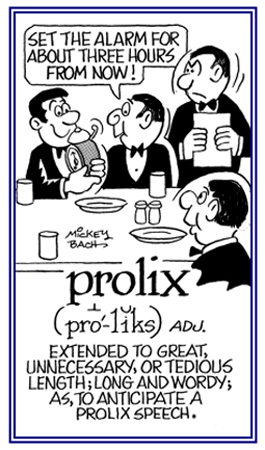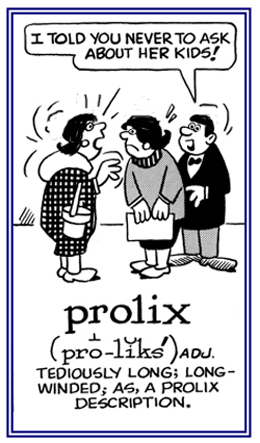liqu-, lique-
(Latin: flow, fluid, wave)
deliquesce
liquefy
liqueur
liquid
Etymology: from Old French liquide, from Latin liquidus, "fluid, liquid, moist"; from liquere, "be fluid". Related to liqui "to melt, to flow".
liquidate
liquidity
liquifacient
liquifaction
liquifier
liquor
liquorrhea
The flow of liquid.
prolix (adjective), more prolix, most prolix
1. Characteristic of a speech, book, written material, etc. which is tiresomely, or overly, wordy or verbose: There are some prolix politicians who expect their audiences to be interested in their long discources when they run for government positions.
2. Regarding a tendency to speak or to write at great length: It takes a lot of persistence for editors to revise and improve a prolix manuscript for publications, etc.
3. A reference to a person using too many words in communicating: The President of the U.S. is thought to be a prolix speaker and he also has a tendency to be a prolix writer with his computer as he tweets so often.
4. Etymology: from Latin prolixus, "extended"; literally, "poured out", from pro-, "forth, before" + liquere, "to flow".

© ALL rights are reserved.

© ALL rights are reserved.
Go to this Word A Day Revisited Index
2. Regarding a tendency to speak or to write at great length: It takes a lot of persistence for editors to revise and improve a prolix manuscript for publications, etc.
3. A reference to a person using too many words in communicating: The President of the U.S. is thought to be a prolix speaker and he also has a tendency to be a prolix writer with his computer as he tweets so often.
4. Etymology: from Latin prolixus, "extended"; literally, "poured out", from pro-, "forth, before" + liquere, "to flow".


Go to this Word A Day Revisited Index
so you can see more of Mickey Bach's cartoons.
prolixity
1. Extended to great, unnecessary, or tedious length; long and wordy.
2. Unduly prolonged or drawn out; too long.
3. Marked by, or using, an excessive number of words.
2. Unduly prolonged or drawn out; too long.
3. Marked by, or using, an excessive number of words.
prolixly
Characterized by using too many words and therefore boring or difficult to read or to listen to; tediously lengthy: "What was supposed to be a simple acceptance speech turned into prolixly ranting which seemed to never end until it was finally stopped by the master of ceremonies."
prolixness
A situation whereby there is too much talking, or writing, at great or tedious length (boring because of being long, monotonous, or repetitive).
<img src="/img/left_arrow_sm.gif" alt="" /> <img src="/img/right_arrow_sm.gif" alt="" />
Showing 1 page of 15 main-word entries or main-word-entry groups.
